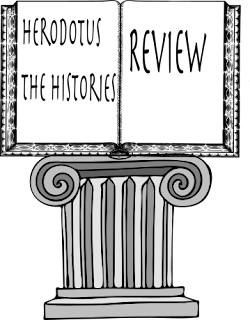The Histories by Herodotus Review
So a
few weeks ago I finally conquered The Histories
by Herodotus, a historian who lived approximately from 484-425 BC.
This notable work of history is partly an account of the war between
Greece and Persia in the 5th century BC, but also an inquiry into
different cultures and nations, which the author has either witnessed
himself (probably), or heard about through oral accounts. I was very
intrigued to read this rather long book, because it is generally
accepted as the foundation of historical writing as a genre, and I
thought it would be fascinating to read about a time that long gone
from someone who was actually alive back then and wrote down what he
was told and witnessed himself.
 It was indeed a
fascinating read, especially the first few books. I read the Penguin
Classics Deluxe edition, which is full to bursting with useful notes,
comes with thirteen different and very handy maps, and two
introductions. These are by the translator (Tom Holland) and editor
(Paul Cartledge) and show their admiration for Herodotus' work. Both
were lovely to read and made me even more excited to dive into the
work.
It was indeed a
fascinating read, especially the first few books. I read the Penguin
Classics Deluxe edition, which is full to bursting with useful notes,
comes with thirteen different and very handy maps, and two
introductions. These are by the translator (Tom Holland) and editor
(Paul Cartledge) and show their admiration for Herodotus' work. Both
were lovely to read and made me even more excited to dive into the
work.
When
it comes to general reading enjoyment, I have to admit that I was
sometimes a bit bored and was looking forward to finally finishing it
(I think it took me at least a month to read it, longer than while I
spent only two weeks on War and Peace).
There are a fair few longer passages on rivers, through which regions
they flow, why they rise at what time, and so on. I really struggled
to concentrate on these parts, because, frankly, I'm just not
interested in that. But that, of course, is my personal opinion, and
I think others might find the detailed descriptions of the land's
makeup more than two thousand years ago very fascinating.
There is also a
huge variety of characters that are introduced at one point and then
reappear at a point much further on in the narrative. The notes were
really helpful here because they indicate where characters were
mentioned before. I would have been completely lost without them. I
was also a bit lost on the different origins and histories of the
different peoples, unfortunately. This might be easier upon a
re-read, I think. When it finally came to the Greco-Persian War, I
felt a bit underwhelmed as well, but that might just have been my
personal opinion, I'm not a big fan of long and tedious battle
scenes.
These
were the only things I disliked about The Histories,
though. Otherwise I was actually drawn into the story at several
points, despite the fact that it is a more or less historical
narrative. The stories about single characters, like Croesus' rise
and downfall or how Darius became king were highly enjoyable. The
part of the narrative concerned with Egypt was also really readable
and entertaining, especially the parts about the mythical creatures
living there, such as the phoenix. This may not be historically
correct on all points, but it just cave the otherwise often dry
narrative a bit more colour.
-->
All in all, I am
very glad to have read this important piece of literature. I don't
know how much I really took from it, but I also think it is a book
that needs to be revisited to get the most out of it. Maybe it also
shouldn't be read in one go, but rather one part here and there, so
as not to get tired of it too quickly. I can still recommend this for
anyone interested in ancient history, who doesn't look for something
too historically accurate but rather for something that takes one
back in time. The introduction to the Penguin Classics Deluxe edition
also points out some useful information on accuracy. So an edition
with notes like those by Penguin can only be recommended to get the
most from the reading experience.




Comments
Post a Comment